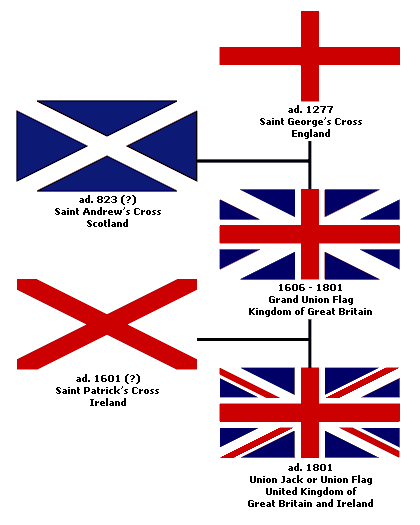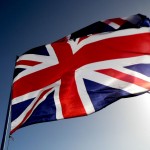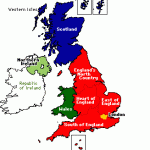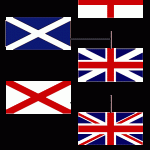An interesting debate on Five Live this morning about the British identity and whether the Olympic euphoria has done anything to change our view about our cultural and national identity, particularly given the fairly unique and complex circumstances attributable to this island nation.
Our reputation as a colonial power was that we practised divide and rule, so small wonder that as a nation we employed similar tactics to our own lands. Our first foray into integration came when Wales was conjoined to England in the 1536 Act of Union. Scotland joined in to form Great Britain in the Act of Union 1707. The United Kingdom, including the historically disputed lands of Northern Ireland, took time to emerge – firstly by adding the whole of Ireland in two further Acts of Union 1800/1, and later partition in Ireland as a result of the Irish civil war and the Government of Ireland Act 1920.
The reason for outlining the legislation is to demonstrate that these constitutional circumstances emerged gradually over a long period, and continue to evolve to this day, slowly, including devolution that enabled limited forms of self-government in Wales, a very different sort of parliament in Northern Ireland, and a third and more radical governance for Scotland. The potential for a referendum on Scottish independence has not gone away, though the chances are that the Scots themselves are not bothered by the prospect, even though they elected the Scottish Nationalist Party to head their government.
The confusion and schizophrenia extend well beyond politics, of course. We may nominally comprise one sovereign state, but we operate four national football teams, and indeed in other sports too. In rugby, the whole of Ireland is united, just to add to the confusion. In the Olympics we had Team GB, though the Scottish and Northern Irish football authorities wanted nothing to do with Team GB on the grounds that it might erode their separate identity, so the Team GB squad consisted of English and Welsh players only.
This reminds me: years ago I did some work for BT and remember well being in a meeting including a board director among various dignitaries from different parts of the organisation. The subject for discussion was the complex and highly confusing structure of the organisation, with many divisions and many overlaps of responsibility. The director said, and I quote: “I’d rather be rich than tidy.” My response: “Just think how much richer you might be if you were organised efficiently.”
Somehow, those sentiments seem to apply well to the UK conundrum, at a logistical and political level at least. We can’t decide whether we want to be one nation, two, three or four, and while politicians seem to think we are stronger united, there seems to be much energy wasted on constitutional arrangements. Had we adopted something closer to the American model things may have been more consistent and manageable, but then maybe they learned from us. State and Federal law and responsibilities work well there, by and large; here there seems confusion every time an issue arises, as if it never occurred to us before.
The old chestnut is the West Lothian Question, famously revived by Tam Dalyell. While we have parliaments for Scotland, Wales and Northern Ireland where no English representatives have any say, there is none for England. Does this mean for any matter pertaining solely to England discussed in Westminster Scottish, Welsh and Northern Irish MPs should absent themselves and have no right to vote? Many will tell you that rather than dealing with constitutional issues in isolation we ought to have a simple, consistent and codified constitution that offers clarity. Do away with different rules at different times for different people! But getting there from here would be nightmarish, such is the inertia and resistance to change within the institutions of the British establishment.
Culturally and emotionally it’s a whole different ballgame. We as a people identify with our country of origin, which for these purposes comprise England, Scotland or Wales, together the British Isles, but also with other forms of identity, be it Great Britain or the United Kingdom. Some have strong identity with the regions of origin, such as the “Independent Republic of Yorkshire” (which was said to be 5th on the Olympic medal table in its own right), Cornwall, Lancashire or other areas. Maybe those are less serious, but they do demonstrate that the further you go from London the more autonomous the outlook of the citizenry.
This is of course before even thinking about other forms of identity, such as Roman Catholics and their loyalty to the Vatican (which you will recall our country shook off in the Reformation, to the extent that a Catholic cannot marry a royal to this day), Muslims and Mecca, and many other religious and national forms of cultural identity.
Then we have the European dimension, since so many of our citizens loathe and detest the concept of our being part of Europe and wanting to return to the “little Englander” school of trade, whereby we preside over the Commonwealth of former colonies. The faded grandeur and identity crisis have long been an issue, arguably since WWII or even before. Britain no longer rules the waves, but seeks dominance and a place on the top table of international affairs. We want to “punch above our weight” in terms of importance to the world, but can’t dissociate ourselves from the past.
Even in the Olympic opening ceremony, one major theme was the conversion from the mythical rural idyll to forging the industrial revolution, being at the forefront of the world, and doing the same in fashion and music, notably in the 60s. Olympic success notwithstanding, perhaps we have turned a blind eye to the fact that we are in many ways peripheral to advances in the world, even if we do have a few niches of excellence in high quality engineering, some medical research etc.
Although many are sceptical, I’ve always taken a different view: since all people have more in common than separates us, I think we are all citizens of the world, wherever we live. After that, I identify with Europe in spite of its mingled languages and cultures, as the heartland of history and civilisation.
But that does not mean I don’t identify with Britain too. “British” characteristics too, though not the “stiff upper lip” since from my perspective showing emotion is not a sign of weakness. However, decency and integrity, being a man of your word, that sort of thing. British virtues? Maybe. The far-right British Freedom party has its version of British “noble virtues” though in practice other people may well apply some better than we do, and I doubt we always practice what we preach:
The Nine Noble Virtues
The Nine Noble Virtues and one interpretation of what they should mean.
- Courage and Selflessness – Be brave, stand up for yourself and what you believe. Do not turn the other cheek.
- Truth – Be honest with yourself. You only kid yourself if you lie. Be truthful to others.
- Honour – Believe in yourself and your people. Stand by what you believe.
- Fidelity – Stay true to yourself, your family, faith and people.
- Discipline and Duty – Develop self-discipline and inner strength rather than relying on other stimuli. Follow these values. Teach others.
- Hospitality – Your hearth should be welcoming to family and others. Help those in need.
- Industriousness – Work hard to achieve your goals and make strong your inner self.
- Self-reliance – Try not to rely on others, do what you can yourself.
- Perseverance – Life is a hard path at times, but push yourself on till you reach your goal.
Yes, I am British by birth, upbringing, nationality and residence; English is my mother tongue and there is much about the country and life here I would miss if I went elsewhere: the green countryside, country pubs and real ale, sporting heritage, fish & chips, the NHS and much more besides. There’s much in our crumbling infrastructure, unaccountable political system, daft bureaucracy and plenty of other things I would not be sorry to see go, but there’s an extent to which you have to take the rough with the smooth.
The old saying “my country, right or wrong” doesn’t sit well with me, nor necessarily the version in Orwell’s essay, “my country, right or left.” I’m British but I don’t believe in flag-waving uber-patriotism or xenophobia, certainly not loyalty to the crown (the monarchy is for a future blog), but neither would I pay heed to fatuous comments from those who are (“if you don’t like it, bugger off.”) It’s part of who I am, for better or worse, and to quote my character Joe Dinmore in They Came To A City:
“It’s man’s eternal desire and vision and hope of making this world a better place to live in.”
Perhaps there is a case for saying Britishness demands a certain eccentricity, and at times we as a nation can be as perverse as any in the world. But while there’s a hope of making things better we should never be complacent about our British identity. Because it is how it is does not mean it always has to be so.
PS. May 2015 and I’ve ignited a new debate on British values. A royalist friend insists that love and celebration of the royal family is an essential component of British patriotism. I disagree wholeheartedly with this analysis, more that royal fervour is an example of what is wrong with British values, suggesting as it does forelock-tugging respect for an inherited birth right to be head of state and the patronising right to rule over British people. In my view, it is the British people, in all their myriad variants and cultural diversity, who form the essence of Britishness – the monarchy does not symbolise or unite us.




